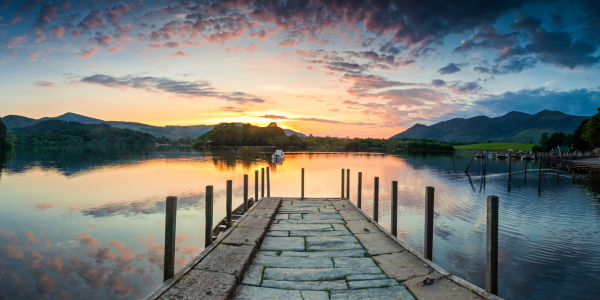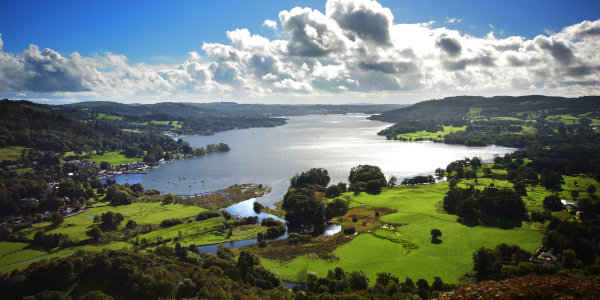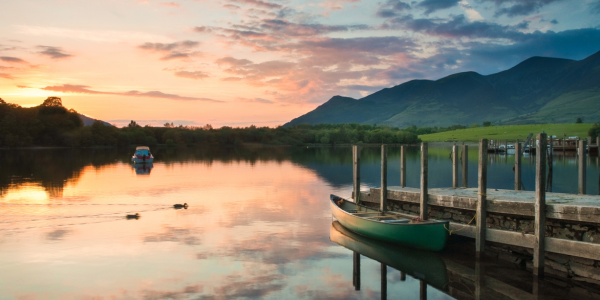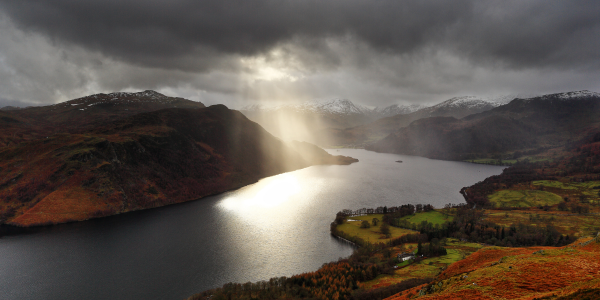Fly fishing is a popular activity in Cumbria, a region in the North West of England that boasts a number of lakes and rivers that are perfect for the sport. With its stunning scenery and diverse range of fishing opportunities, Cumbria is a destination that attracts anglers from all over the world.
The Lake District, in particular, is a well-known location for fly fishing. The region is home to a number of lakes, including Windermere, Coniston Water, and Ullswater, which are open to public fishing. These lakes are home to a variety of fish species, including brown trout, pike, perch, and arctic charr, which is a local delicacy. Additionally, the River Eden is a popular spot for river fly fishing, with its trout and grayling providing a challenge for even experienced anglers.
Whether you are a beginner or an experienced angler, Cumbria has something to offer. With its abundance of lakes and rivers, there are plenty of opportunities to fish for a variety of species. From the stunning scenery of the Lake District to the challenging river fly fishing of the River Eden, Cumbria is a destination that is sure to delight any angler.
Cumbria’s Lakes and Rivers

We are fortunate to have a wealth of fishing opportunities here in Cumbria, with numerous lakes and rivers providing a wide range of angling experiences. Whether you prefer fly fishing for trout or coarse fishing for pike, there is something for everyone.
One of the most popular destinations for fly fishing in Cumbria is Windermere, the largest lake in England. This beautiful body of water is home to a variety of fish species, including brown trout, pike, perch, roach, and eels. Other lakes that are well worth a visit include Coniston Water and Ullswater, which are also open to the public for fishing.
If you prefer river fishing, Cumbria has plenty to offer as well. The Rivers Greta and Derwent are particularly popular for fly fishing for brown trout, as well as for salmon and sea trout. The River Eden is another great option for fly fishing, with its clear waters and abundance of fish.
For those who enjoy coarse fishing, there are plenty of opportunities to catch pike, perch, and other species in Cumbria’s lakes and rivers. Bassenthwaite Lake is a particularly good spot for pike fishing, while the River Eamont is known for its large perch.
It’s worth noting that permits are required for most fishing locations in Cumbria, and it’s important to check the rules and regulations before you go. Many fishing spots also have restrictions on the size and number of fish that can be caught, so be sure to familiarise yourself with the guidelines before you start fishing.
Overall, Cumbria’s lakes and rivers offer a fantastic range of fishing opportunities, with something to suit all interests and skill levels. Whether you’re a seasoned angler or a beginner, there’s no shortage of places to explore and fish in this beautiful part of the country.
Fly Fishing in Cumbria’s Lakes
When it comes to fly fishing in Cumbria, there are plenty of options available. Whether you’re looking for native brown trout, wild salmon, or other species, you’re sure to find a lake or river that suits your needs. In this section, we’ll take a closer look at some of the best lakes for fly fishing in Cumbria.
Lake Windermere
Lake Windermere is the largest natural lake in England and is a popular destination for fly fishing. The lake is home to a variety of fish species, including brown trout, pike, and perch. Anglers can fish from the shore or from a boat, and there are plenty of opportunities to catch a big one.

Access points for fishing
- Bowness-on-Windermere: This popular town on the eastern shore of Lake Windermere offers several access points for fishing. You can find spots along the promenade or near the Bowness Pier.
- Ambleside: Another beautiful town on the northern shore of the lake, Ambleside provides access to various fishing locations, including the Ambleside Pier area.
- Lakeside: Located on the southern tip of Lake Windermere, Lakeside is home to the Lakeside and Haverthwaite Railway, which has a fishing platform along the shoreline.
- Waterhead: Situated near Ambleside, Waterhead offers opportunities for fishing and is easily accessible from the A591.
- Newby Bridge: Located at the southern end of the lake, Newby Bridge provides access to fishing spots and is known for its tranquil surroundings.
- Fell Foot Park: Operated by the National Trust, Fell Foot Park on the southern shore offers designated fishing areas and beautiful views.
- Far Sawrey: On the western shore, you can find fishing spots around Far Sawrey, providing a quieter and more secluded fishing experience.
- Ferry Nab: Near the northern end of Lake Windermere, Ferry Nab provides access to the water for fishing enthusiasts.
Derwentwater Lake
Derwentwater Lake is another popular destination for fly fishing in Cumbria. The lake is home to brown trout, pike, and perch, as well as other species. Anglers can fish from the shore or from a boat, and there are plenty of opportunities to catch a big one. The lake is also surrounded by stunning scenery, making it a great place to spend a day on the water.

- Keswick: The town of Keswick, situated on the northern shore of Derwent Water, provides various access points for fishing. You can explore areas around Keswick’s jetties and piers.
- Portinscale: Located just to the west of Keswick, the village of Portinscale offers accessible fishing spots along its shoreline.
- Nichol End Marina: This marina is situated on the western shore of Derwent Water and serves as a popular starting point for fishing excursions. They provide boat hire and fishing tackle.
- Ashness Bridge: If you prefer a quieter and more remote fishing experience, Ashness Bridge on the eastern shore offers some peaceful spots.
- Borrowdale: The Borrowdale Valley, which lies to the south of Derwent Water, is another excellent area for fishing, particularly along the river Derwent.
- Friars Crag: This scenic viewpoint near Keswick also provides access to the lake for fishing, and you can enjoy beautiful views while waiting for a bite.
- Strandshag Bay: Located on the northeastern side of Derwent Water, Strandshag Bay offers serene fishing opportunities.
Ullswater Lake
Ullswater Lake is a beautiful lake located in the heart of the Lake District. The lake is home to brown trout, pike, and perch, as well as other species. Anglers can fish from the shore or from a boat, and there are plenty of opportunities to catch a big one. The lake is also surrounded by stunning scenery, making it a great place to spend a day on the water.
Overall, Cumbria is a great place for fly fishing, and there are plenty of lakes and rivers to choose from. Whether you’re a seasoned angler or just starting out, you’re sure to find a lake or river that suits your needs.

Access points
- Pooley Bridge: The village of Pooley Bridge, situated on the northern shore of Ullswater, is a popular starting point for fishing excursions. You can find various fishing spots along the shore and near the pier.
- Glenridding: This picturesque village is located on the southern shore of Ullswater and offers multiple access points for fishing. Glenridding Pier is a notable location for anglers.
- Howtown: On the eastern shore of the lake, you’ll find the hamlet of Howtown, which provides access to fishing spots and is often less crowded than some of the more touristy areas.
- Aira Force: The Aira Force waterfall and park, located on the western shore of Ullswater, offer beautiful scenery and opportunities for fishing in the nearby areas.
- Park Foot Holiday Park: Situated on the eastern shore, Park Foot Holiday Park has a fishing area and provides access to Ullswater.
- Patterdale: The village of Patterdale, just south of Glenridding, also offers fishing opportunities along its shore.
Fly Fishing in Cumbria’s Rivers
When it comes to fly fishing, Cumbria’s rivers offer some of the best fishing experiences in the UK. Here are some of the top rivers to consider for your next fly fishing trip in Cumbria:
River Eden
The River Eden is one of the most popular fly fishing destinations in Cumbria. This river is home to a wide variety of fish, including brown trout, sea trout, and salmon. The best time to fish for salmon on the River Eden is from June to October, while the brown trout season runs from March to October.
There are several beats available for fishing on the River Eden, each with its own unique characteristics. Some of the most popular beats include the Warwick Hall, Armathwaite, and Corby Castle beats. These beats offer a range of fishing experiences, from fast-flowing stretches to slower, more tranquil waters.
Access points
- Carlisle: The city of Carlisle, where the River Eden flows through, offers several access points for fishing. You can explore areas near the city center or along the riverbanks.
- Armathwaite: This village is located on the River Eden’s banks and provides access to fishing spots, including the renowned Eden Lacy Beat, which is known for its salmon and trout fishing.
- Lazonby: Lazonby and its surroundings offer access to the River Eden and are popular for both salmon and trout fishing.
- Kirkby Stephen: Further upstream, the town of Kirkby Stephen and the surrounding areas provide access to the river, offering a more remote and tranquil fishing experience.
- Appleby-in-Westmorland: Another picturesque town on the River Eden, Appleby-in-Westmorland, offers various fishing locations along the riverbanks.
- Great Musgrave: Located to the east of Appleby, Great Musgrave is another area where you can access the River Eden for fishing.
- Temple Sowerby: This village, situated downstream from Appleby, provides access to the river for angling enthusiasts.
- Sandford: Sandford is another village along the River Eden’s course and offers opportunities for fishing in the area.
River Derwent
The River Derwent is another popular fly fishing destination in Cumbria. This river is known for its excellent brown trout fishing, with fish averaging around 1lb in weight. The best time to fish for brown trout on the River Derwent is from April to September.
There are several beats available for fishing on the River Derwent, including the Cockermouth Angling Association beat and the Keswick Anglers Association beat. These beats offer a range of fishing experiences, from fast-flowing stretches to slower, more tranquil waters.
Access points –
- Cockermouth: The town of Cockermouth, located at the confluence of the Rivers Derwent and Cocker, provides access to the River Derwent for fishing enthusiasts. You can explore various spots along the riverbanks in and around Cockermouth.
- Bassenthwaite Lake: The River Derwent flows into Bassenthwaite Lake, and the areas near the lake’s outflow provide opportunities for fishing. The lake itself is known for coarse fishing.
- Keswick: As the River Derwent flows south from Bassenthwaite Lake, it passes through the town of Keswick. You can find fishing spots within Keswick and along the riverbanks.
- Portinscale: The village of Portinscale, located near Keswick, offers access to the River Derwent, making it a convenient location for fishing.
- Borrowdale: The Borrowdale Valley, situated further downstream, offers peaceful fishing spots along the River Derwent. This area provides a tranquil and scenic environment for anglers.
- Derwentwater: The lake formed by the River Derwent as it flows through the Borrowdale Valley, Derwentwater, offers opportunities for both lake and river fishing. Various access points can be found along the lake’s shoreline.
- Grange-in-Borrowdale: This village in the Borrowdale Valley also provides access to the River Derwent, allowing anglers to explore different fishing locations.
River Kent
The River Kent is a smaller river that is often overlooked by fly fishermen. However, this river offers some excellent fishing opportunities for brown trout and grayling. The best time to fish for brown trout on the River Kent is from April to September, while the grayling season runs from October to March.
There are several beats available for fishing on the River Kent, including the Levens Hall beat and the Staveley beat. These beats offer a range of fishing experiences, from fast-flowing stretches to slower, more tranquil waters.
Overall, Cumbria’s rivers offer some of the best fly fishing experiences in the UK. Whether you’re a seasoned angler or a beginner, there’s something for everyone in Cumbria’s rivers.
Access points
- Kendal: The town of Kendal, where the River Kent flows through, provides access to various fishing spots. You can explore areas along the riverbanks within the town.
- Staveley: The village of Staveley, located downstream from Kendal, is another access point for fishing along the River Kent.
- Burneside: Just a short distance from Kendal, the village of Burneside offers access to the river, making it convenient for anglers looking for fishing opportunities.
- Sedgwick: Located further downstream, the village of Sedgwick is another spot where you can access the River Kent for fishing.
- Levens: The village of Levens, known for its historic gardens, also offers access to the River Kent and fishing locations nearby.
- Milnthorpe: As the River Kent continues its journey, the town of Milnthorpe provides access to fishing spots along its course.
- Arnside: Towards the end of its journey, the River Kent flows into Morecambe Bay near the village of Arnside, offering opportunities for fishing at the estuarine areas.
Frequently Asked Questions
What are the best lakes and rivers for fly fishing in Cumbria?
Cumbria is home to some of the best fly fishing spots in the UK. The Lake District National Park is known for its stunning scenery and excellent fishing opportunities. Some of the best lakes for fly fishing in Cumbria include Windermere, Coniston Water, and Ullswater. The River Eden is also a popular spot for river fly fishing.
What fish species can be caught while fly fishing in the Lake District?
The Lake District is home to a variety of fish species that can be caught while fly fishing. Brown trout and grayling are the most common species found in the rivers and lakes of the Lake District. Other species that can be caught include pike, perch, roach, eels, and arctic charr.
How can I obtain a fishing permit for fly fishing in the Lake District?
Fishing permits for the Lake District can be obtained from a number of sources. Many of the fishing clubs in the area offer permits for their waters. You can also purchase permits from local tackle shops and online. It’s important to note that some of the waters in the Lake District are privately owned, so it’s important to check before you fish.
What are the rules and regulations for fly fishing in Lake Windermere?
Lake Windermere is one of the most popular lakes for fly fishing in the Lake District. However, there are some rules and regulations that you need to be aware of before you fish. The lake is divided into different zones, and each zone has its own rules and regulations.
Where can I find free fishing spots in Cumbria?
There are a number of free fishing spots in Cumbria that you can take advantage of. Some of the best spots include the River Derwent, the River Greta, and the River Lowther.
What is the best time of year to go fly fishing in Cumbria?
The best time of year to go fly fishing in Cumbria depends on the species you’re targeting. Brown trout and grayling can be caught year-round, but the best time to catch them is in the spring and autumn. Pike and perch are best caught in the summer months, while eels are best caught in the winter. It’s always a good idea to check with local experts to find out the best time to fish for your chosen species.